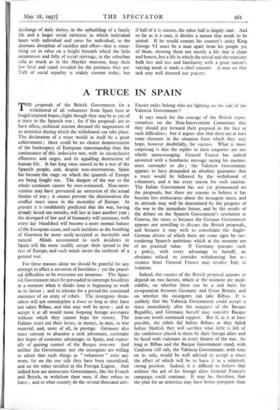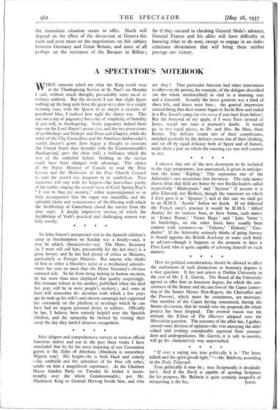A TRUCE IN SPAIN T HE proposals of the British Government
for a withdrawal. of all volunteers from Spain have at length inspired hopes, slight though they may be as yet, of a truce in the Spanish war ; for if the proposals are to have effect technical reasons demand the negotiation of an armistice during which the withdrawal can take place. The declaration of a truce would in itself be a great achievement ; there could be no clearer demonstration of the bankruptcy of European statesmanship than the continuance of this indecisive war, with its inconclusive. offensives and sieges, and its appalling destruction of human life. It has long since ceased to be a war of the Spanish people, and, despite non-intervention, Spain has become the stage on which the quarrels of Europe are being fought out. The dangers of the war to the whole continent cannot be over-estimated. Non-inter- vention may have prevented an extension of the actual theatre of war ;_ it cannot prevent the deterioration the conflict must cause in the mentality of Europe. At present it is confidently predicted that the war, having already lasted ten months, will last at least another .year ; the disregard of law and of humanity will continue, with every day bloodshed will become a more normal feature of the European scene, and such incidents as the bombing of Guemica be more• easily accepted as inevitable and natural. Minds accustomed to such incidents in Spain will the more readily accept their spread to the rest of Europe, and such minds-invite the outbreak of g general war.", For these reasons alone we should be grateful for any attempt to effect a cessation of hostilities ; yet the practi- cal difficulties to be overcome are immense. The Span- ish Government must be persuaded to interrupt hostilities at a moment when it thinks time is beginning to work in its favour ; and to tolerate for a period the continued existence of an army of rebels, The insurgents them- selves will not contemplate a truce so long as they have not taken tilbao, and that may well be never ; and to accept it at all would mean forgoing foreign assistance without which they cannot hope for victory. The Italians must cut their losses, in money, in men, in war material, and, most of all, in prestige. Germany also must consent to abandon a rash adventure, surrender her hopes of economic advantages in Spain, and especi- ally of gaining control of the Basque iron-ore. And neither the Government nor the insurgents are willing to admit that such things as " volunteers " exist any more, for on the one side they have been naturalised, and on the other enrolled in the Foreign Legion. And indeed how are democratic Governments, like the french and British, to withdraw their men, if. they refuse to. leave ; and to what country do the several thousand anti- Fascist exiles belong who are fighting on the side of the Valencia Government ?
It says much for the courage of the British repre- sentatives on the Non-Intervention Committee that they should put forward their proposal in the face of such difficulties; but it argues also that there are at least some elements in the situation from which they may hope, however doubtfully, for success. What is more surprising is that the replies to their enquiries are not wholly unencouraging. General Franco has indeed answered with a bombastic message saying his enemies must surrender or die ; the Valencia Government appears to have demanded an absolute guarantee that a truce would be followed by the withdrawal of volunteers, and it has every reason for such caution. The Italian Government has not yet pronounced on the proposals, but there are reasons to believe it has - become less enthusiastic -about the insurgent cause, and its attitude may well be determined by the progress of the war in the immediate future, and by the results of the debate on the Spanish Government's resolution at Geneva, the more so because the German Government appears not unwilling to _discuss the British proposals, and because it may wish to consolidate the Anglo- German détente of which there are some signs by sur- rendering Spanish ambitions which at the moment are' of no practical value; If Germany pursues such a policy, with every advantage to herself, an obstinate refusal to consider withdrawing her as- sistance from General Franco may involve Italy in isolation.
Indeed, the success of the British proposal appears to depend on two factors, which at the moment are incal- culable, on whether there can be a real basis for co-operation between Germany and Great Britain, and on whether the insurgents can take Bilbao. It is unlikely that the Valencia Government could accept a truce immediately after the conquest of the Basque Republic, and Germany herself may consider Basque iron-ore worth continued support. But if, as is at least possible, the .rebels fail before Bilbao, as they failed. before Madrid, they will sacrifice what little is left of the confidence placed in them by their foreign allies and be faced with stalemate in every theatre of the war. So long as Bilbao and the Basque Government stand, with Catalonia still safe, the Valencia Government, with time on its side, would be well advised to accept a truce the effect of which will be. to leave it in a relatively strong position. Indeed, it is difficult to believe that without - the aid of his foreign allies General Franco's campaign- could continue. It may be, therefore, that- the plan for an armistice may have better prospects than
the immediate situation seems to offer. Much will. depend on the effect of the discussion at Geneva this week and even more on the negotiations on this subject between Germany and Great Britain, and most of all perhaps on the resistance of the Basques in Bilbao ; for if they succeed in checking General Mola's advance, General Franco and his allies will have difficulty in knowing what to do next, except to engage in an indis- criminate devastation that will bring them neither prestige nor victory.







































 Previous page
Previous page